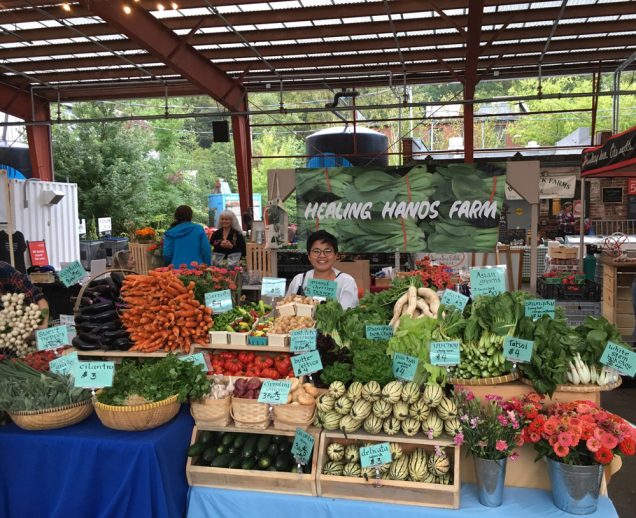Farm to Table: How the pandemic is keeping Michaela Cruz busy
Farm to Table: How the pandemic is keeping Michaela Cruz busy

Michaela Cruz, co-owner of Healing Hands Farm,
at Evergreen Brickworks. (Photo supplied by Michaela Cruz)
By Irish Mae Silvestre
The Philippine Reporter
As schools, restaurants and businesses started closing early this year, empty grocery shelves and supermarket line-ups reflected our collective anxieties about food supply. So, what’s it like for a farmer at the top of the food supply chain?
Michaela Cruz, 27, says that so far, it’s been a hectic time.
“For local farms it’s been a busier year than the past because maybe there’s more demand for local food,” she said. “People are cooking more.”
Together with her partner Dan Fuller, Cruz co-founded Healing Hands Farm in 2017, an organic farm with a focus on Asian greens.
“Our whole plan for what we grow is based on sinigang,” said Cruz in a 2018 interview with The Philippine Reporter. “We have this theme that pretty much everything we grow can go into a sinigang.”
Two years later, there’s been a lot of changes at Healing Hands Farm. Aside from relocating their farm from Guelph to Oustic, they now have a large greenhouse that allows them to grow a wider variety of vegetables.
“We’ve started to grow ginger and more lemongrass,” said Cruz. “We also grow more bok choy and the greenhouses are really good for peppers so more sweet peppers and hot peppers.”
And their bestseller? Bok choy.
“Other sellers don’t really have them regularly so it’s nice when customers look for bok choy and they come to our stand and we always have it.”
While Healing Hands Farm can still be found on Saturdays at Evergreen Brickworks, they’ve since cut back to bi-weekly market days.
One aspect of the business that Cruz has focused on is their vegetable subscription service.
“We went from 30 to 60 [subscribers] this year and the fact that we were able to do that was like, whoa!” said Cruz.
But with these changes come additional costs.
“In the past we made [our subscription service] market style where people pick their own vegetables and put it in their bags,” she explained. “We ended up buying separate bins for everybody so we can pack everything. We open a bin and they take [the products] out. We’d sanitize the bin and we’d do that every week. It’s also on us – we just decided to do that as a system. It felt necessary so everybody’s safe.”
She said that during this time, loans would’ve offered a big boost for their business.
As a member of the Canada United Small Business Relief Fund, Cruz stays informed on news about funding available for farmers. However, some programs aren’t exactly accessible to small scale farmers who need them most.
“In order to be eligible you have to have a minimum annual sale of [around] $200,000. What?” she said, incredulously. “We certainly don’t have that. They call them small to medium-sized companies but that’s absurd and confusing. Who is this for?”
She adds that young farmers face a lot of hurdles when it comes to applying for loans from lenders like Farm Credit Canada. Therefore, she said that it doesn’t surprise her that young farmers have started turning to crowdsourced funding.
“I think it’s a manifestation that there’s not enough support that you have to start your own Go Fund Me to get that financial help,” said Cruz.
In the meantime, she’s curious to see if farmers will be just as busy next year.
“I think it’s because the pandemic made people realize that [local] food is important,” she said. “It’s a double whammy: people realize local food is necessary not just accessible but also it’s good for your immune system to fight off the viruses.”
Comments (0)